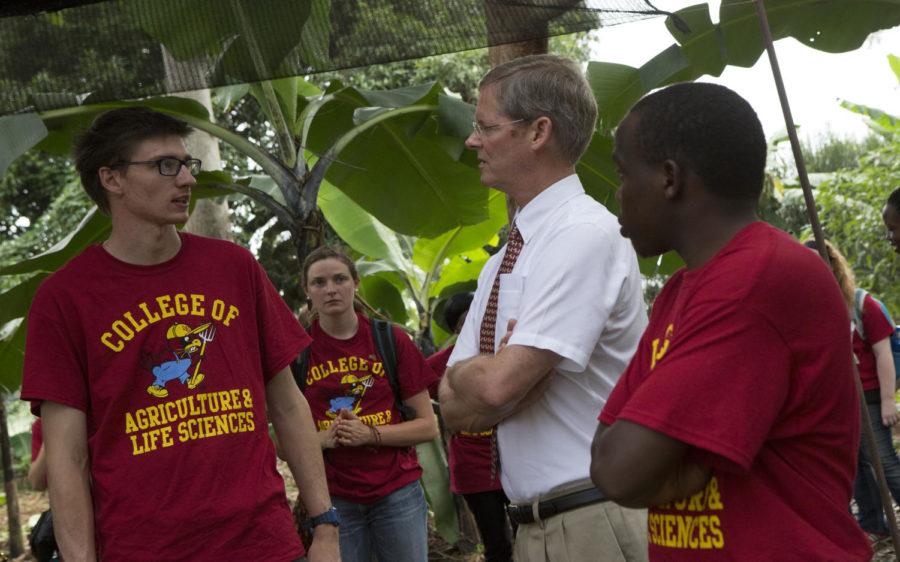Garden program in Uganda works to educate children
David Acker, Associate Dean of ISU’s academic and global programs, learning about the school garden program from Iowa State and Makerere University students.
October 30, 2014
Opportunity was a foreign concept in the Kamuli District 10 years ago. Today, opportunity in the small Ugandan town is difficult to miss.
The transformation can, at least in part, be attributed to Iowa State’s Center for Sustainable Rural Livelihood (CSRL).
The CSRL has been involved in the Kamuli District for more than 10 years.
The primary mission of the CSRL is to improve the quality of life for people who live in a impoverished community. The CSRL uses agriculture as a gateway to supply adequate nutrition, sanitation and education.
“I know firsthand what it means to be poor,” said Dorothy Masinde, associate director for nutrition education in the CSRL. “I have a passion for people who I feel are not as lucky as I am today.”
The CSRL aligns itself with local researchers in Uganda who are familiar with food production in the region. Based on the researchers’ recommendations and advice, the CSRL works to facilitate efficient methods of food production.
Gail Nonnecke, faculty coordinator of ISU’s Global Resource Systems, said the biggest challenge facing the Kamuli District is that many people in the region lack the opportunity to become educated about agriculture.
“Uganda has a suitable climate to be able to produce crops,” Nonnecke said. “It’s a matter of learning how to best do that.”
The Kamuli District is located in Eastern Uganda and is commonly regarded as one of the poorest locations in Africa.
“The yield levels of crops in the Kamuli District are quite low because of poor soil fertility, plant diseases and the use of seeds that do not have high growing potential,” said David Acker, associate dean of academic and global programs.
Acker said the CSRL chose to become involved in the Kamuli District because of its complex situation and problems with agricultural production, nutrition, access to clean water and disease prevention.
“We also were looking for a place that was stable enough so that we could make some progress and still send students and faculty,” Acker said.
Acker and Nonnecke were part of a team which traveled to Uganda in 2005 to complete a participatory study.
They talked with parents in the Kamuli District about the possibility of developing a school garden program. Parents in the Kamuli District wanted the school garden to be established.
“We started a school garden program in which we send Iowa State students to the Kamuli District who partner with students and faculty from Makerere University to live and work together in local schools,” Nonnecke said.
The school garden program operates at five schools in the Kamuli District. To this day, the school garden program educates children about agriculture, demonstrates efficient agricultural strategies and provides income for school lunches.
In addition to enhancing children’s nutrition, Nonnecke said the school garden program has helped to increase the serving size of school lunches from 50 to 850 calories.
“The school garden program is like an outdoor learning laboratory, but it also provides for the students’ lunches,” Nonnecke said.
Masinde has worked in Africa to improve the standard of living for more than 30 years. Her motivation comes from her desire to provide everyone with the same opportunities that she had as a child.
Masinde’s objective is to teach those in the Kamuli District to use the resources available to them to overcome their inherent obstacles.
“It’s not just one problem. It’s a lot of challenges that these people are facing every day,” Masinde said.
The CSRL has impacted nearly 10,000 lives in the Kamuli District.
Masinde said she wants ISU students to understand that Iowa State is a global university.
“Iowa State is not just about being in Ames,” Masinde said. “It’s about making changes globally. We’re actually saving lives.”







